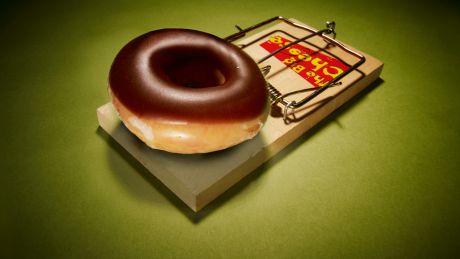Use These Six Healthy Eating Tips To Avoid Junk Food Traps
No food should be off limits – but too much of the wrong sort of foods is a bad idea. Here’s how to avoid excess

1. Remove And Restock
If temptation’s in the way, it’s hard to make good choices: in one study from Cornell University in the US, office workers ate four times more sweets when they were moved from opaque containers two metres away to see-through containers left on their desks. If possible, get “binge” foods out of the house entirely – but if that’s not an option, move them to a shelf or container where you don’t have to look at them.
2. Break Your Habit Loops
Your brain loves habits because they save on cognitive load, and often that’s fine. Brushing your teeth twice daily? Good. Grabbing a Twix at 11am every day? Not so much. Habits, according to MIT research, follow a three-step pattern: cue, routine, reward. Identify the cue (say, it’s Friday evening), the routine (sinking three pints) and the reward you get from it (which could be boredom relief, relaxation or something else) – then aim to change the routine. Could you get the same effect from hanging out socially with zero booze? From hitting the gym? Going paragliding? OK, maybe not every Friday.
3. Change Your Language
“I shouldn’t/I mustn’t/I can’t” is the language of people who’ll be back at the biscuit tin by the second week of their health kick. In a recent study from Boston College, two groups of adults were instructed to use either “I don’t” or “I can’t” when talking about skipping the gym or resisting doughnuts. The “don’t” group were eight times more likely to stick to their resolutions. Re-framing the thought – even to yourself – puts the power back in your hands and head, and reminds you that the choice really is yours.
4. Find the ‘Out’ Crowd
In a seminal 1950s experiment, psychologist Solomon Asch asked test subjects to identify which of a pair of lines was longer but secretly surrounded them with planted actors giving the wrong answer. Peer pressure was enough to nudge the volunteers to go along with the obviously-wrong crowd, but a single dissenter typically gave them the courage to switch. The lesson? Find one or two “outliers” – non-boozing, clean-eating good examples – in your social groups to remind yourself that habit change is possible.
See related
- 13 Expert Weight-Loss Tips
- This High-Fibre Meal Plan Is About As Healthy As It Gets
- How to Stop Loving Fries (and Reboot Your Relationship with Food)
5. Challenge Your Beliefs
No, you don’t have to change your mind on the death penalty or proportional representation. But take ten minutes to write down any self-limiting beliefs you have, such as “You can’t have a good time without alcohol” or “Life just wouldn’t be the same without cake”. “Imagine you’re a lawyer and it’s your job to destroy these arguments,” says OneYearNoBeer.com founder Andy Ramage. “Has there been a time they weren’t true? Have you had fun without those things?” Finally, decide on whether they’re helping or hurting you… and ditch the ones you need to.
6. Change Your Heart
Recent research suggests that heart rate variability is a key indicator of your ability to cope with stress. The higher your HRV (the gaps between heartbeats), the greater your ability to slow it down during stressful events and temptation. The good news? You can positively affect your HRV through exercise, sleep, diet and mindfulness, so each strand of your healthy lifestyle will (hopefully) make the others easier.
Sign up for workout ideas, training advice, reviews of the latest gear and more.
From 2008 to 2018, Joel worked for Men's Fitness, which predated, and then shared a website with, Coach. Though he spent years running the hills of Bath, he’s since ditched his trainers for a succession of Converse high-tops, since they’re better suited to his love of pulling vans, lifting cars, and hefting logs in a succession of strongman competitions.

